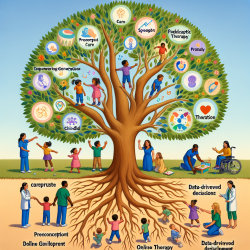Introduction
The COVID-19 pandemic has significantly impacted the mental health of health professional (HP) students, highlighting the critical role of perceived social support and coping strategies. A recent study, "The impact of perceived social support and coping on distress in a sample of Atlantic Canadian health professional students during COVID-19 compared to pre-COVID peers," provides valuable insights into how these factors influence student well-being. As practitioners in the field of education and therapy, understanding these dynamics can help us create more supportive environments for our students.
Understanding the Research
The study examined second-year HP students, revealing that they experienced moderate to severe psychological distress during the pandemic. Despite reporting high levels of perceived social support, many students felt isolated. This paradox suggests that while students believed they had support, the pandemic's constraints limited their access to it, exacerbating feelings of distress.
Key findings include:
- HP students reported higher psychological distress compared to pre-COVID peers.
- Social support and resilience were significant predictors of distress levels.
- Barriers to accessing mental health services included accessibility, financial constraints, and stigma.
Actionable Insights for Practitioners
As practitioners, we can leverage these findings to enhance our support for HP students. Here are some strategies to consider:
- Enhance Accessibility: Reduce barriers to mental health services by offering flexible appointment times, online counseling options, and clear information about available resources.
- Promote Resilience: Incorporate resilience training into curricula to help students develop adaptive coping strategies that can mitigate stress and prevent burnout.
- Foster Social Connections: Create opportunities for peer interaction and support, even in virtual settings, to combat feelings of isolation.
- Address Financial Barriers: Advocate for increased funding and insurance coverage for mental health services to alleviate financial burdens on students.
Encouraging Further Research
While this study provides a foundation, further research is needed to explore the long-term effects of enhanced social support and resilience training on HP student outcomes. Future studies could focus on diverse student populations and varying educational contexts to develop comprehensive strategies that address the unique challenges faced by HP students.
Conclusion
By understanding and implementing the findings from this research, we can create more supportive and effective educational environments for HP students. These efforts will not only improve student well-being but also enhance their professional competencies, ultimately leading to better patient care.
To read the original research paper, please follow this link: The impact of perceived social support and coping on distress in a sample of Atlantic Canadian health professional students during COVID-19 compared to pre-COVID peers.










